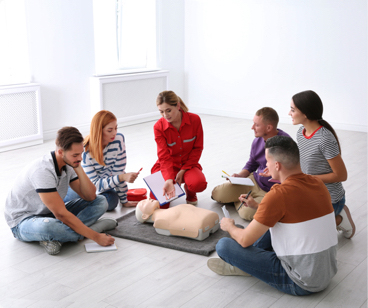
First Aid Training Ottawa: Saving Lives One Skill at a Time
Introduction
Welcome to the world of first aid training Ottawa, where ordinary people become heroes equipped with life-saving skills. Whether you’re a concerned citizen, a parent, or a professional looking to make a difference, first aid training is an invaluable asset. In this comprehensive guide, we’ll explore why first aid training matters, basic and advanced techniques, specialized training for Ottawa residents, where to acquire training, certification procedures, and more.
Why First Aid Training Matters
First aid training is not just a skill; it’s a responsibility. It empowers individuals to respond effectively to emergencies, potentially saving lives in critical situations. Accidents and medical emergencies can happen anytime, anywhere, and having the knowledge to administer first aid promptly can make a significant difference in the outcome.
Basic First Aid Techniques
CPR and AED Training
Cardiopulmonary Resuscitation (CPR) and Automated External Defibrillator (AED) training are fundamental skills taught in first aid courses. CPR helps maintain blood circulation and oxygenation in the event of cardiac arrest, while AEDs can restore a regular heart rhythm.
Wound Management and Bandaging
Knowing how to clean and dress wounds properly can prevent infections and promote healing. Basic bandaging techniques are essential for controlling bleeding and protecting injured areas.
Choking Relief
Choking is a life-threatening emergency that requires immediate intervention. First aid training Ottawa teaches techniques to dislodge obstructions from the airway, potentially saving a choking victim’s life.
Advanced First Aid Techniques
Handling Fractures and Sprains
Understanding how to stabilize fractures and immobilize injured limbs is crucial for preventing further damage and reducing pain.
Dealing with Severe Bleeding
In cases of severe bleeding, quick and effective action is necessary to control bleeding and prevent shock. First aid training provides the knowledge and skills to apply pressure, elevate limbs, and use hemostatic agents when needed.
Treating Burns
Burn injuries require specialized care to minimize tissue damage and prevent complications. First aid training Ottawa covers the appropriate steps for assessing burn severity and providing initial treatment.
Specialized First Aid for Ottawa Residents
Addressing Cold-related Injuries
Ottawa’s cold climate presents unique challenges, including frostbite and hypothermia. Specialized first aid training prepares individuals to recognize and manage cold-related injuries effectively.
Managing Allergic Reactions
With allergies becoming increasingly prevalent, knowing how to recognize and respond to allergic reactions is crucial. First aid courses include training on administering epinephrine and managing anaphylaxis.
Handling Water-related Incidents
Ottawa’s proximity to water bodies necessitates awareness of water safety and rescue techniques. First aid training equips individuals with the skills to respond to drowning incidents and provide lifesaving assistance.
Where to Get First Aid Training
Local Ottawa Training Centers
Numerous training centers in Ottawa offer comprehensive first aid courses conducted by certified instructors. These courses may include classroom instruction, hands-on practice, and certification exams.
Online First Aid Courses
For convenience and flexibility, online first aid courses are also available. These courses allow participants to learn at their own pace and convenience, making them ideal for busy individuals or those unable to attend traditional classes.
Certification and Renewal
Importance of Certification
Certification validates an individual’s competency in administering first aid and CPR. Many employers, organizations, and community groups require certification for certain roles or positions.
Renewal Procedures
First aid certifications typically have expiration dates and require renewal to ensure skills remain current. Renewal procedures may involve refresher courses, skills assessments, or written exams.
Costs and Accessibility
Affordability of Training
The cost of first aid training Ottawa varies depending on the type of course, duration, and provider. However, many training centers offer affordable options, and some courses may be eligible for subsidies or discounts.
Accessibility for Various Groups
First aid training is accessible to people of all ages and backgrounds. Specialized courses are available for specific groups, such as parents, childcare providers, educators, and healthcare professionals.
FAQs (Frequently Asked Questions)
Q: How long does first aid certification last?
A: Typically, first aid certifications are valid for 2-3 years before requiring renewal.
Q: Can I perform first aid without certification?
A: While anyone can offer assistance in an emergency, proper training and certification ensure that first aid is administered correctly and effectively.
Q: Are there age restrictions for first aid training?
A: Most first aid courses have no age restrictions, but participants must demonstrate maturity and understanding of the concepts taught.
Q: Can I take an online first aid course?
A: Yes, many reputable organizations offer online first aid courses, providing flexibility for busy individuals or those unable to attend in-person classes.
Q: What topics are covered in basic first aid training?
A: Basic first aid training typically covers CPR, AED use, wound care, choking relief, and recognizing and responding to common medical emergencies.
Q: How do I find a certified first aid training provider in Ottawa?
A: You can search online for accredited training centers or contact local organizations, such as the Red Cross or St. John Ambulance, for recommendations.
Conclusion
First aid training Ottawa is not just a skill; it’s a lifesaving asset that empowers individuals to make a difference in emergencies. By acquiring essential first aid skills and staying updated through certification and renewal, Ottawa residents can contribute to safer communities and potentially save lives. Remember, being prepared can make all the difference in an emergency situation.
